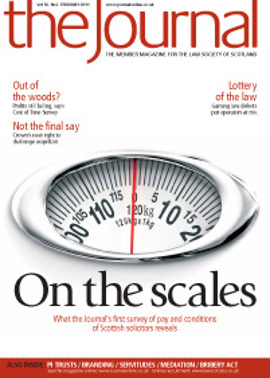CICA - a question of timing

On the face of it, it’s very straightforward – there’s a two-year period in which to make an application to the Criminal Injuries Compensation Authority (CICA) for compensation for injuries resulting from violent crime. Yet it can all go so wrong – as a result of failures in critical date management, ineffective communication with clients and CICA, or failures in supervision.
CICA is a public body which administers a compensation scheme for injuries suffered by victims of violent crime. Many individuals wishing to claim compensation from CICA will instruct a personal injury lawyer to do so. Unfortunately, many CICA claims end up turning into professional negligence claims.
Missed time limits
Initial two-year limit
An application to CICA must be made within two years of the incident that caused the injury.
There is some flexibility in that CICA may accept applications outside the two-year limit if, in the particular circumstances of the case, it wasn’t reasonable for an application form to have been submitted within the time limit and there would still be enough evidence for CICA to consider the matter. However, it’s dangerous to apply late and rely on CICA’s discretion. A CICA case worker won’t view an error by a solicitor as reasonable cause for allowing an application to be submitted late.
There are numerous reasons for solicitors not submitting CICA applications within the two-year limit. Sometimes it’s because the solicitor is simply not focused on the CICA claim. For example:
Case study 1
- A partner in the insured acted for a client who had been working as a control room operator answering 999 calls for a police force. The client suffered serious hearing damage and psychological injury when she answered a telephone call made from a phone booth in which a firework was set off. With the assistance of counsel, the partner pursued a negligence claim against the police force on the grounds that the telephone equipment that the client had been using was defective. The partner subsequently obtained engineering evidence which confirmed that the telephone equipment met the relevant British Standards. It was therefore clear that the police had not been negligent and the claim against them was withdrawn. By this time, the two-year time limit for applying to CICA had passed. The client instructed new solicitors who did make a CICA application on her behalf, but this was rejected on the grounds that the delay in submitting the application meant that CICA was “unable to obtain sufficient relevant information to show that [the client] was injured as a result of a crime of violence”. The client’s new solicitors brought a loss of opportunity claim against the insured. When notified of the claim, the partner conceded that she had taken her eye off the ball, commenting: “Although when first instructed the potential of a CICA claim was identified, once civil proceedings were pursued, the need to pursue any CICA claim was overlooked”. The claim was settled for £15,000.
Effective diary management could have prevented this claim.
Failing to make sure that an application has actually been received by CICA is another common cause of the two-year limit being missed:
Case study 2
- The insured, a sole practitioner, was instructed to make a CICA claim by a client who had suffered a serious leg injury caused by an assault. The insured was convinced that she had submitted an application on the client’s behalf, but had not received any acknowledgment or indeed any correspondence at all from CICA. It was not until after the two-year time limit expired that the insured contacted CICA, who told her that they had never received the application. The solicitor’s file was no help: it contained a copy of the original application form, but there was no evidence that the original had ever been sent. The insured submitted a new application on the client’s behalf, but this was rejected as being out of time. The client instructed new solicitors who brought a loss of opportunity claim against the insured.
To avoid such errors, whenever you do submit a CICA application, keep a copy on the file and make a note of when the application was sent. If CICA don’t respond with a reference number, chase the matter up.
Problems in communicating with clients and in failing to highlight the existence of the two-year limit can lead to negligence claims:
Case study 3
- A partner in the insured was instructed to make a CICA application by a client who had sustained an injury to her eye when sprayed with gas by a youth. The partner failed to progress the matter and missed the two-year time limit. The client claimed that, had the partner advised her of the two-year time limit and its importance, she would have instructed new solicitors sooner. The partner’s response was that he had invited the client for an appointment but the client had failed to attend. The partner said that he wrote to the client requesting that she make another appointment but received no response so he stopped doing work on the file. The client had a different recollection. She insisted that she did attend the insured’s office for the appointment only to be told by a receptionist that the partner was unavailable. She also said that she called personally at the insured’s offices on two further occasions and made numerous telephone calls but received no response.
Some solicitors have been known to go to extreme lengths to cover having missed a time limit:
Case study 4
- An assistant mislaid a CICA application form and overlooked submitting it. By the time he realised that no application had been submitted, the two-year time limit had passed. The assistant told neither the client nor his supervising partner of his mistake. Instead, he pretended that CICA had made an award and paid the client £2,000 from his own funds! This was only discovered after the assistant left the insured. At that point, a partner contacted the client to explain what had happened. The client told the partner that his nose had healed and he only had occasional problems, such as having blocked sinuses and slight tingling in cold temperatures. He was happy with the £2,000 he had received. However, shortly afterwards, with an eye on the main chance, the client instructed new solicitors who brought a claim against the insured alleging that, as a result of the injury to his nose, the client had significant loss of taste and smell and also that, as a result of the assault, the client suffered a nervous breakdown and was unable to work for three years. The client claimed from the insured the difference between the £2,000 he received and the higher award he said he should have received given the alleged consequences of his injuries.
This example clearly demonstrates a failure in critical date management and of supervision within the firm involved. It also suggests that the culture of the firm was such that the assistant didn’t feel comfortable in owning up to his error. To minimise the likelihood of professional negligence claims in any area of legal practice, effective supervision is crucial. It’s also important to establish an atmosphere in your firm such that individuals will feel comfortable with bringing any errors to the attention of someone senior in the firm, rather than covering them up.
90-day review time limit
It’s not just the initial two-year time limit that can be missed; other CICA time limits also exist. For example, if a client isn’t satisfied with a first decision by a claims officer, he or she can apply for review of that decision by a different claims officer. That application for review must be received by CICA within 90 days of the date of issue of the original decision. This time limit can be extended only if there are “exceptional” circumstances.
Heads of claim
Missing time limits is not the only cause of professional negligence claims in this area. Another common cause is failing to include all relevant heads of claim in the CICA application.
Failing to look beyond physical injuries when considering compensation can lead to claims. Compensation is also available for any type of personal injury. For the purposes of CICA, “personal injury” includes physical injury, disease and mental injury, which is defined as “medically verified temporary mental anxiety” or “a disabling mental illness confirmed by a psychiatric diagnosis”.
Awards can also include compensation for:
- a loved one having died as a result of a violent crime
- special expenses (e.g. NHS costs, care costs etc); or
- loss of earnings.
With loss of earnings claims, no compensation is available for the first 28 weeks following any injury. It’s vital to recognise when the 28 weeks may be exceeded and to review the situation regularly, as a client’s ability to work may change.
In this issue
- Mutuality in action
- Tough choices
- Show us the files
- RoS launch business eZine
- Rewards of the job
- Pressure points
- Measure for measure
- Rage against the machine?
- Second bite at the cherry
- Personal injury trusts: benefits and PITfalls
- Countdown for Legal Aid Online
- Training: SYLA will play its part
- Law reform update
- Branding or bragging?
- The learning curve
- Ask Ash
- Mediating retirement
- CICA - a question of timing
- The evidence against
- Fought all the way
- Family friendly
- Stakes too high
- Much ado about plenty
- Limits of authority
- Scottish Solicitors' Discipline Tribunal
- Website review
- Book reviews
- Straight dealing
- Servitudes, developers and flexible rights






